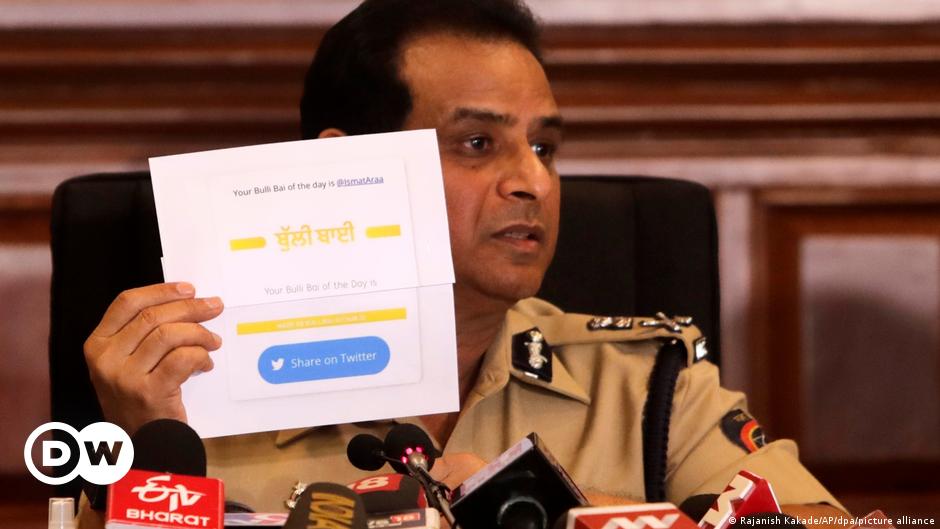
Indian journalist Zeba Warsi woke up one morning in early January to find her name on an online “auction” app targeting Muslim women.
“I felt angry, and really helpless that this is happening to me and so many other Muslim women in the country,” she told DW.
The open source app on the Github platform called Bulli Bai — a derogatory term which is sometimes used to describe Muslim women — had shared pictures of dozens of women without their consent before it was taken down.
Users could bid on journalists, activists, celebrities and artists, with their photos and names displayed as “Bulli Bai of the Day.”
“If you are a woman and a Muslim voice in this country, you become a soft target,” Warsi said.
Over 100 women were listed on the app, most of whom were vocal on social media platforms, especially about the rights of Muslims in India.
“They’re journalists, activists, politicians, they’re active in the social space in India. They’re vocal about issues in the country, specifically about the rising Islamophobia in the country,” Warsi said.
“It is very clear why we were targeted. In a patriarchal society like India, if you want to target a community, you target its women,” she said, adding that the perpetrators were likely emboldened by the rise of Hindu right-wing ideology.
Several other Indian Muslim journalists were targeted by the app, including Ismat Ara who filed and then shared on social media a police complaint that said the app was “designed to insult Muslim women.”
Mumbai police said they were investigating whether the app, which did not involve any actual auctioning of people, was part of a “larger conspiracy.”
Watch video 04:13 Muslim women in India again targeted by online ‘auction’
Police crack down on app architects
IT Minister Ashwini Vaishnaw said GitHub had confirmed blocking the user and that the country’s cyber security authority and police are coordinating for further action.
The “government of India is working with police organizations in Delhi and Mumbai on this matter,” he said.
Police in the cities of Mumbai and Delhi have arrested four people so far.
The creator of the app, Neeraj Bishnoi, including three other perpetrators, Shweta Singh, Mayank Rawal, and Vishal Kumar Jha, are believed to be influenced by Hindu right-wing ideology. All of them were between the ages of 18 and 25 years, police said.
The youngest of those arrested so far is from the northern Indian state of Uttarakhand.
The 18-year-old made contact with Hindu right-wing users on social media after finishing her school-leaving exams in 2021, a local police official told Reuters.
The official, who declined to be named, said she had told him that her actions were based on Hindu right-wing ideology, which she had picked up on social media platforms Facebook, WhatsApp and Twitter.
“She came to social media to distract herself but she kept getting entangled in it,” the official said.
Delhi police have also arrested Aumkareshwar Thakur, the man believed to be responsible for the first app, Sulli Deals — another pejorative term for Muslim women. The app too created an online auction, describing its targets as “deal of the day.”
‘Hate factories’
The Wire reported on Thursday that the app Tek Fog is used by users to “amplify right-wing propaganda to a domestic audience.” The Indian news outlet also claimed the app had links to India’s ruling Bharatiya Janata Party (BJP).
Two days later, opposition politician Rahul Gandhi tweeted about the “hate factories” created by the BJP, which he claimed led to the radicalization of the makers behind the Bulli Bai app.
Journalist Arfa Khanum Sherwani then released on Sunday a list of prominent female voices from various faiths, including Hindus, who have been targeted and threatened by Tek Fog.
The ruling party and Prime Minister Narendra Modi have not released a formal statement on the matter so far.
Watch video 02:30 Protesters in Delhi defy police over citizenship law
‘They hate women’
Women throughout India have expressed concerns over the use of apps and social media platforms to spread hate and target religious minority groups.
“I have toned down a lot on social media. We all have families who get bothered a lot, especially with this level of helplessness,” Hasiba Amin, the opposition party’s national social media convener, said in an interview with local newspaper The Deccan Herald.
Amin was targeted in the Bulli Bai and Sulli Deals cases. She told the newspaper that those behind the app “hate” vocal women.
“A vocal Muslim woman is everything that they hate — they hate women, they hate women who speak up, and they hate Muslims. All the women they targeted had a combination of these three things,” she said.
Muslims make up around around 14% of India’s 1.3 billion population. Some sections of the minority community have been at odds with Prime Minister Modi’s administration and Hindu right-wing supporters, including over a controversial 2019 citizenship law that sparked mass protests.
Edited by: Sou-Jie van Brunnersum







